Public Affairs & Policy Expert
Entry Level Qualification
Graduate
Career Fields
Humanities, Liberals Arts & Social Science
For Specially Abled




About Career
PARTICULARS | DESCRIPTION |
Name | Public Affairs & Policy Expert |
Purpose | Analyze and Monitor Legislation |
Career Field | Humanities, Liberals Arts & Social Science |
Required Entrance Exam | GMAT, LSAT, GRE |
Average Salary | 300000 - 500000 Rs. Per Year |
Companies For You | Brookings Institution, Rand Corporation, Heritage Foundation & Many More |
Who is Eligible | Graduate |
1. Public Affairs and Policy Experts analyze what causes various social, economic and other issues and problems faced by a very large number of people in a country or even the entire population of a country or a state.
2. They may even analyze regional issues (regions such as Asia Pacific, South-East Asia, Middle East, Latin America, etc.) as well as global/ international issues. They also research and study to find out probable solutions to such mass problems and issues.
Analyzing the reasons behind mass problems & issues – Few examples
Some examples of the issues & problems that such experts may analyze are:
1. The problem of drop outs from schools after class 5 and after class 8 in rural India – what are the reasons behind the drop-outs
2. The problem of housing for migrant laborers in Mumbai from various states in eastern and northern India
3. The problem of distribution of potable water to semi-urban and rural areas in India;
4. Different kinds of subsidies that could be given to farmers in India to improve crop yields
5. How to solve hunger & malnutrition problems faced by the urban poor people living in urban slums
6. How to improve distribution of free food ration to people living under poverty lines in rural areas
7. Public Affairs and Policy Experts not only conduct analysis about such situations but also research & study to find out probable solutions to the problems and issues faced by a very large number of people in a state, country, or a region or even globally.
The word “public policy” typically refers to the strategies adopted by the governing body of a nation or community.
1. The term literally refers to a set of actions the government takes to address issues within society and the needs of its citizens through actions defined by its constitution. Public policies are supposed to be analyzed, designed and adopted by the state / central Governments and other Government bodies.
2. Government departments/ offices/ agencies may also outsource their projects or research proposals pertaining tovarious professional spaces such a telecommunication, agriculture, civil inspections, connectivity &transportation, IT, heavy machinery manufacturing, non-renewable energy crises, pharmaceuticals, nuclear energy etc.
3. However, a lot of large scale private organizations, businesses, NGOs, charities, banks, media production houses, real estate companies, manufacturing companies, engineering companiesetc.in their individual capacities today employ Public Policy Experts and Analysts too.
4. Public Policy Experts and Analysts are employed in these firms to monitor & research their economic & regulatory policies towards their customers, stakeholders and impact groups or to assess government activities of importance as well as anticipate potential government actions.
Getting the idea? Read these cases:
1. New York City
In the 1980s and early 1990s, crime situation in New York City was at its peak. It was a dangerous place to live with the homicide rates peaking, the surge in brutal killings (6 people killed in a day and 15-20 being shot & wounded), and the risk of robbery & muggings being a daily reality for its 7 million residents. All this while, policemen of NYPD were quitting jobs in large numbers.
To solve the situation Public Policy Analysts were called in. With their suggestion under the aegis of the MODA (Mayor’s Office of Data Analytics), full digitization of the crime data was carried out using a system called CompStat (Computerized Comparison of Crime Statistics) and also integration of data from 40 different city agencies was carried out. Using this, crime prone areas were identified and preventive actions were taken. By the end of the decade, New York City’s crime rate had dropped by half.
2. Timor Leste
By mid-2011, Timor Leste, a small country in South East Asia, which had been independent for 9 years, faced a crisis to put rice on the plates of Timorese. Rice was their staple food. The Government depended less on the domestic production and more on rice import. But as the cost of import was high, the Government had to subsidize the price of rice per kilogram. This created a huge drain in the Government’s fund. The financial loss was increasing as the population was growing steadily.
Public Policy Experts were called in and with their suggestion various policies were made and implemented to solve the problem. Subsidies were shifted to locally produced rice and no longer allocated to imported rice. Yield of rice was boosted with Government support by the use of high yielding seeds, fertilizers, etc. A lot of emphasis were given to produce export quality cash crops to earn export income which boosted Government’s fund.
Key Roles And Responsibilities
You will be engaged in one or more of the following roles and responsibilities as well as other associated duties:
1. You will focus on analyzing mass-facing problems such as agricultural policies, road transportation policies, economic policies etc. that impact the general public as a whole, conducting research about such problems, testing ideas, data collection, and policy making &analysis for building & development of probable solutions to the problems.
2. You will plan or perform market/ public opinion research to test policy solutions or determine the success potential for them, communicating the results to client and management.
3. You will execute studies, surveys, & research projects and you will develop data collection procedures & forms, survey methodology sampling criteria and data analysis techniques.
4. You will work to assess government activities of importance, anticipate potential government actions, and develop mitigation or enhancement strategies & positions to assist in external advocacy efforts, outreach programs, and key initiatives of a company.
5. You will translate complex bureaucratic text (articles, reports, notices etc. composed in a formal technical political language) into plain language content and work to transform them & develop informative articles by either conducting interviews or gathering information from news programs/ items.
6. You will help conduct literature review of publications, monitor legislation & regulations to determine the impact of new developments for particular cases.
7. You will plan program needs & progress; supervise officials, technicians & other staff and provide oversight regarding educational opportunities for students, professionals, and fellows.
Career Entry Pathway
Class 10 all subjects as per scheme of studies – Class 11-12 with any subject as per scheme of studies - Bachelor’s in Public Administration/ Public Policy & Administration/ Public Affairs/ Public Administration and Management or similar
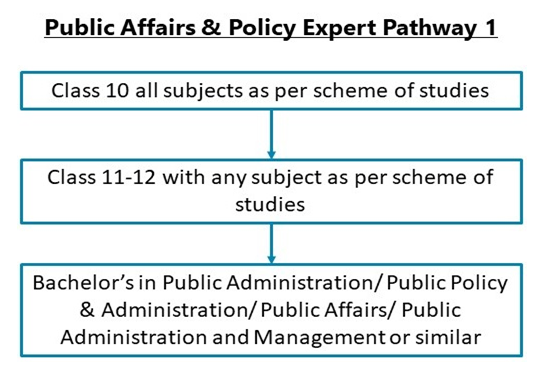
After completing Class 11-12 with any subject as per scheme of studies, you can go for a Bachelor’s in Public Policy & Administration/ Public Affairs or similar. However, such Bachelor degree programs with similar titles are few and far between, even abroad and not just India. It is advisable that you go for post-graduation to practice in this discipline. That way, you can complete graduation in any discipline as described in the other entry pathways and then specialize in this domain.
Class 10 all subjects as per scheme of studies – Class 11-12 with any subject as per scheme of studies - Bachelor’s in Public Administration/ Public Policy & Administration/ Public Affairs/ Public Administration and Management or similar – Master’s in Public Policy (MPP) / Social & Public Policy/ Public Affairs/ International, Social and Public Policy/ Public Policy & Administration or similar
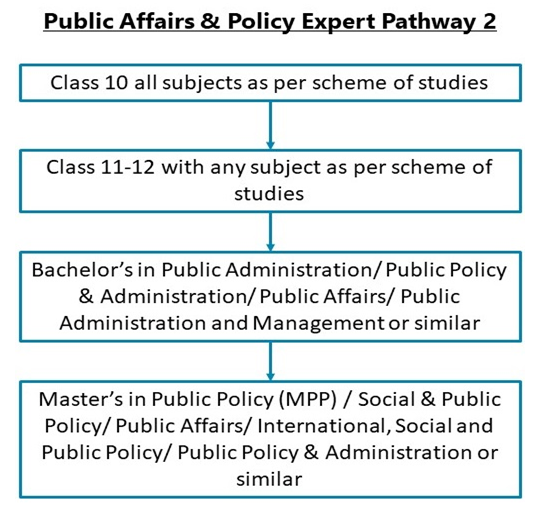
After completing Class 11-12 with any subject as per scheme of studies and a Bachelor’s in Public Administration/ Public Policy & Administration/ Public Affairs/ Public Administration and Management or similar, you can go for a Master’s in Public Policy (MPP) / Social & Public Policy/ Public Relations/ Public Affairs/ International, Social and Public Policy/ Media & Public Relations/ Public Policy & Administration or similar.
Class 10 all subjects as per scheme of studies – Class 11-12 with any subject as per scheme of studies - Bachelor’s in Law/ Journalism & Mass Communication/ Liberal Arts/ English Literature/ Economics/ Political Science/ History/ Geography/ International Relations - Master’s in Public Policy (MPP) / International Public Affairs/ Social & Public Policy/ Public Affairs/ International, Social and Public Policy/ Public Policy & Administration/ or similar disciplines
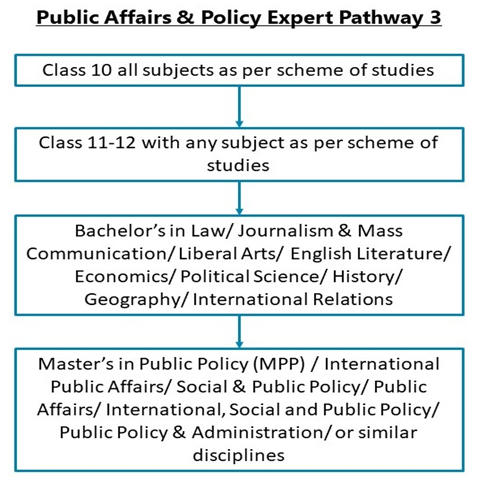
After completing Class 11-12 with any subject as per scheme of studies, you can go for a Bachelor’s in Law/ Journalism & Mass Communication/ Liberal Arts/ English Literature/ Economics/ Political Science/ History/ Geography/ International Relations. Then pursue Master’s in Public Policy (MPP) / International Public Affairs/ Social & Public Policy/ Public Affairs/ International, Social and Public Policy/ Public Policy & Administration/ or similar disciplines.
Class 10 all subjects as per scheme of studies – Class 11-12 with any subject as per scheme of studies - Bachelor’s in Social Science, Sociology, Social Work or similar – Master’s in Public Policy (MPP) / International Public Affairs/ Social & Public Policy/ Public Affairs/ International, Social and Public Policy/ Public Policy & Administration/ or similar disciplines
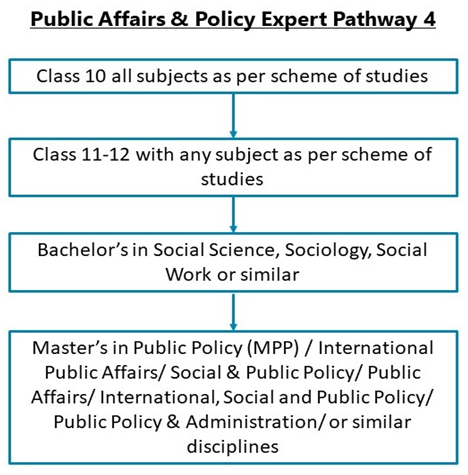
After completing Class 11-12 with any subject as per scheme of studies, you may go for a Bachelor’s in Social Science, Sociology, Social Work(BSW) or similar and then pursue Master’s in Public Policy (MPP) / International Public Affairs/ Social & Public Policy/ Public Affairs/ International, Social and Public Policy/ Public Policy & Administration/ or similar disciplines.
Class 10 all subjects as per scheme of studies – Class 11-12 Physics, Chemistry and Mathematics along with any other subject as per scheme of studies – Bachelor’s in any field of Science, Technology, Engineering or Mathematics/ Statistics / Data Science/ Operational Research or similar – Master’s in Public Policy (MPP) / International Public Affairs/ Social & Public Policy/ Public Affairs/ International, Social and Public Policy/ Public Policy & Administration/ or similar disciplines
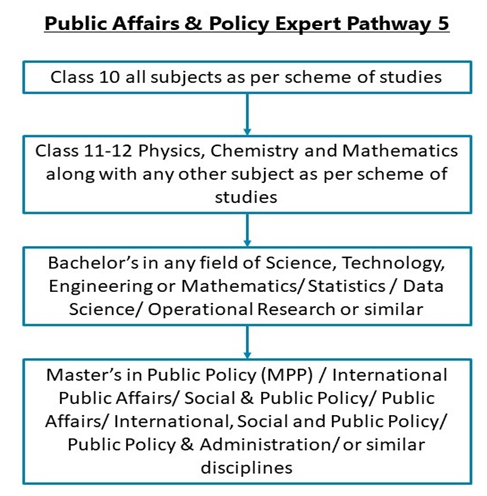
After completing Class 11-12 Physics, Chemistry and Mathematics along with any other subject as per scheme of studies and a Bachelor’s in any field of Science, Technology, Engineering or Mathematics/ Statistics/ Data Science/ Operational Research or similar, you may go for Master’s in Public Policy (MPP) / International Public Affairs/ Social & Public Policy/ Public Affairs/ International, Social and Public Policy/ Public Policy & Administration/ or similar disciplines. You will be preferable to recruiters operating in the engineering, pharmaceuticals or manufacturing domains. Thereafter you may go for a PhD in public economics, nonprofit management, urban policy & management, community organization & civic engagement, education policy, public management, health policy, communication & policy studies, international policy studies, public policy & administration or similar topics within your area of interest in this field.
Class 10 all subjects as per scheme of studies – Class 11-12 with any subject as per scheme of studies - Bachelor’s degree in any discipline – work for at least 5 years – Advance Management Program in Public Policy or similar courses
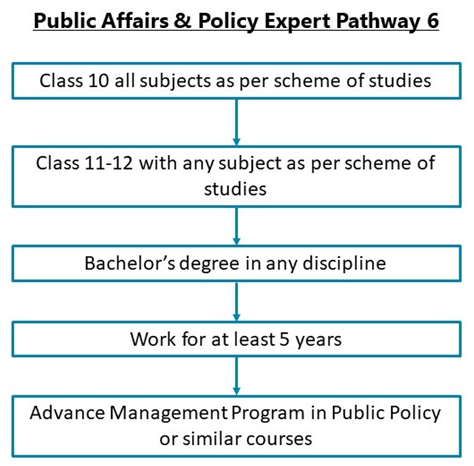
After completing Class 11-12 with any subject as per scheme of studies and a Bachelor’s degree in any discipline, you must work for at least 5 years in any field before you can opt for an advance degree such as Advance Management programs in Public Policy or similar courses. These are short term courses usually for a minimum duration of 12 months.
Class 10 all subjects as per scheme of studies – Class 11-12 with any subject as per scheme of studies - Bachelor’s degree – Master’s in Public Policy (MPP) / International Public Affairs/ Social & Public Policy/ Public Affairs/ International, Social and Public Policy/ Public Policy & Administration/ or similar – M Phil – PhD
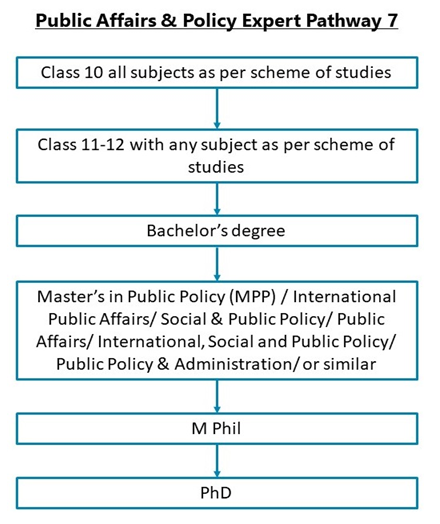
After completing Class 11-12 with any subject as per scheme of studies, you can go for a Bachelor’s in Public Policy & Administration/ Public Relations/ Public Affairs/ Social Science/ Sociology/ Social Work/ Law/ Journalism & Mass Communication/ Liberal Arts/ English Literature/ Economics/ Political Science/ History/ Geography/ International Relations or similar. Then pursue Master’s in Public Policy (MPP) / International Public Affairs/ Social & Public Policy/ Public Affairs/ International, Social and Public Policy/ Public Policy & Administration/ or similar disciplines. Thereafter pursue MPhil and/ or PhD degree programs in public economics, nonprofit management, urban policy & management, community organization & civic engagement, education policy, public management, health policy, communication & policy studies, international policy studies, public policy & administration or similar topics within your area of interest in this field.
Required Qualification & Competencies
To get into this field, you will need to pass Class 10 all subjects as per scheme of studies. Then you must complete Class 11-12 with any of the following combinations of subjects:
1. Class 11-12 with any subject as per scheme of studies
2. Class 11-12 Physics, Chemistry and Mathematics along with any other subject as per scheme of studies
After Class 11-12:
1. You can go for a Bachelor’s in Public Administration/ Public Policy & Administration/ Public Affairs/ Public Administration and Management or similar.
2. You can go for a Bachelor’s degree in Social Science/ Sociology/ Social Work.
3. You can go for a Bachelor’s degree in Law/ Journalism & Mass Communication/ Liberal Arts/ English Literature/ Economics/ Political Science/ History/ Geography/ International Relations.
4. You can go for a Bachelor’s degree in any field of Science, Technology, Engineering or Mathematics/ Statistics/ Data Science/ Operational Research or similar.
5. You can go for a Bachelor’s degree in any discipline.
You can study for a Bachelor’s / Master’s / Doctoral degree in any of the following fields (Note that all these fields may not offer you a degree at all three levels, that is in Bachelor’s, Master’s and Doctoral. Some fields may offer a degree only at the Master’s or at the Doctoral level):
1. Public Policy and Administration
2. Public Affairs and Public Policy
3. Public System Administration
4. Community and Public Systems Management
5.Humanities and Social Sciences
6. Social Work
7. Sociology
8. Economics
9. Statistics
10. Operational Research
11. Journalism and Mass Communication
12. Liberal Arts
13. Political Science
14. International Relations
15. History
16. Geography
17. Any field of Engineering
18. Any field of Science
MINIMUM EDUCATION REQUIRED | MAXIMUM EDUCATION REQUIRED |
Post Graduate Postgraduate Degree / Diploma / Certificate Programs for which the minimum eligibility is a pass in Graduation / equivalent Diploma program like Honours Diploma or Graduate Diploma. | Doctoral All Ph.D. or equivalent degree programs for which the minimum eligibility is a Postgraduate or a Pre-Doctoral degree. |

Competencies Required
Interests
1. You should have interests for Social Occupations. Social occupations involve helping or assisting others; these involve working with and communicating with people to provide various services; these may involve educating and advising others.
2. You should have interests for Investigative Occupations. Investigative occupations involve working with ideas and quite a lot of thinking, often abstract or conceptual thinking. These involve learning about facts and figures; involve use of data analysis, assessment of situations, decision making and problem solving.
3. You should have interests for Enterprising Occupations. You should have interests for Enterprising Occupations. Enterprising occupations involve taking initiatives, initiating actions, and planning to achieve goals, often business goals. These involve gathering resources and leading people to get things done. These require decision making, risk taking and action orientation.
Knowledge
1.You should have knowledge of Politics & Governance - Knowledge about different political ideologies, political systems and processes, governance standards and processes, constitutions, etc.
2. You should have knowledge of Social and Developmental Work - Knowledge about various principles, theories and processes to help underprivileged or disadvantageous people develop mentally, socially and economically and with other benefits. This includes education and employment.
Skills
1. You should have Active Listening Skills - Giving full attention to what other people are saying, understanding the points being made by others, asking questions, etc.
2. You should have Coordination Skills - working together with other people to get things done.
3. You should have Critical Thinking skills- Skills in the analysis of complex situations, using logic and reasoning to understand the situations and take appropriate actions or make interpretations and inferences.
4. You should have Judgment and Decision Making Skills - considering pros and cons of various decision alternatives; considering costs and benefits; taking appropriate and suitable decisions.
5. You should have Persuasion Skills - Skills in persuading others to change their minds or behaviour.
6. You should have Problem Solving Skills - Skills in analysis and understanding of problems, evaluating various options to solve the problems and using the best option to solve the problems.
Ability
1. You should have Written Expression Ability - The ability to communicate information and ideas in writing so others will understand.
2. You must have Inter-Personal Ability - The ability to build and maintain good relationships with others at workplaces and elsewhere.
3. You should have Problem Sensitivity - The ability to tell when something is wrong or is likely to go wrong. It does not involve solving the problem, only recognizing there is a problem.
4. You should have Oral Expression Ability - communicate information and ideas in speaking so others will understand.
5. You should have Auditory Attention - The ability to focus on a single source of sound in the presence of other distracting sounds.
6. You should have Oral Comprehension Ability - listen to and understand information and ideas presented through spoken words and sentences.
7. You should have Deductive Reasoning Ability - apply general rules and common logic to specific problems to produce answers that are logical and make sense. For example, understanding the reasons behind an event or a situation using general rules and common logic.
8. You should have Inductive Reasoning Ability - The ability to combine pieces of information from various sources, concepts, and theories to form general rules or conclusions. For example, analyzing various events or situations to come out with a set of rules or conclusions.
9. You should have Speech and Language Recognition Ability - The ability to identify and understand the speech and language of another person.
Personality Traits
1. You are always or mostly caring, supportive, sympathetic and kind to others.
2. You can always act independently or could do so in most situations.
3. You always prefer to experience new things and have new experiences, or you mostly do.
4. You are always or mostly careful about your actions and behavior.
5. You are always or mostly disciplined in your action and behavior.
6. You are always calm or generally remain calm in most situations.
Career - Job Opportunities & Profiles
The profession of public policy & affairs is very diverse. People work for many different types of organizations doing many different kinds of jobs for a wide range of pay.
Employer Types
1. A degree in Public Policy and related disciplines opens up multi-disciplinary, multi-dimensional avenues for you. You will primarily work as a Policy Advisor/ Consultant/ Analyst/ Officer/ Fellow/ Specialist in any of the various diverse fields & industries including:
2. Housing, healthcare, finance (including banks), social services, advocacy, city planning, education, IT, food & beverages, manufacturing, healthcare, transportation, disaster response, natural resources, in India or internationally in the private, voluntary & public sectors, including central as well as local governments.
You can aspire to become a
1. Public Policy Associate
2. Public Affairs Consultant
3. Public Administration Consultant
4. Humanitarian Affairs Officer
5. Policy Analyst
6. Public Policy Fellow
7. Youth Worker
8. Special Assistant, Political Affairs
9. Program Analyst
10. CSR (Corporate Social Responsibility) - Advisor
Options in the government/ public sector include:
1. Work with any government owned corporations, ministries, or departments in central/ devolved governments such as transportation, health, urban/ rural development, defense, justice, treasury, law, science & technology, labor, agriculture, public services, education etc.
2. Political affiliations such as working for a national parliamentarian or state/local legislator (such as some MPs or MLAs who maintain an office/team for public policies, affairs or political strategies); duties ranging from campaign operations, legislative analysis, events, communications, as well as policy development.
3. Non-political options within the government sector, duties ranging from program analysis, program management & administration, as well as policy development for local, state, national government agencies such as NITI Aayog, National Development Council, AICTE, CSIR, Indian Council of Agricultural Research (ICAR), boards & commissions such as Railway Board, University Grants Commission which assist the respective ministries or the cabinet as a whole in policy formulation etc.
4. Government-constituted ad hoc expert committees to provide recommendations regarding administrative reforms & policy initiatives such as the University Education Commission etc.
5. Within the nonprofit arena, as a public policy graduate you can conduct policy research; do advocacy work on specific policy issues including policy management, development, & communication; or be entrepreneurs starting your own nonprofit or non-governmental organization (NGO).
Alternatively, you may work with intergovernmental, transcontinental organisations
1. Policy-making advisory organizations such as United Nations etc.
2. Agricultural or public research organizations such as International Food Policy Research Institute, International Water Management Institute
3. Humanitarian organizations such as International Organization for Migration, International Cospas-Sarsat Programme etc.
4. Law enforcement organizations such as the Interpol (International Criminal Police Organization) etc.
5. Environmental organizations such as Global Environment Facility, The International Union for Conservation of Nature etc.
6. Arms control organizations such as Nuclear Suppliers Group or Organisation for the Prohibition of Chemical Weapons etc.
7. Sustainable energy organizations such as International Renewable Energy Agency, International Solar Alliance etc.
8. Financial, trade and customs organizations such as International Monetary Fund, Organization for Economic and Co-operation Development, World Bank Group etc.
The private sector is increasingly looking for graduates from this discipline too.
In this respect, you may work with Public Policy teams or similar teams within any large privately owned mass facing enterprises/ consumer facing businesses or service providers operating in many industries including food & beverages, insurance, education, public transportation, healthcare, finance (including banks), IT, manufacturing, etc. such as Tata Steel, Sterlite, Amazon, Google, Microsoft, Facebook, Novo Nordisk, Verizon, PepsiCo, Waymo, Ernst & Young, Deloitte, Uber, and so on.
Specialisation Tracks In This Career
1. Public Affairs & Policy Expert (Community Organization & Civic Engagement)
Community Organization & Civic Engagement experts explore the role of citizenship by examining a variety of ways that people can work together to influence public policy decisions made by government. They analyze ideas and concepts related to community, leadership, service, organization, capacity building and social change. They study about how social change occurs, how members of a community can work together and how individuals can affect in public policy issues and implement their analyses. They focus on leadership in community service, public opinion formation, education policies in the changing world of today, business-government relationship, community development, voters & elections, political participation of the general masses, social organization of communities and social stratification etc.
2. Public Affairs & Policy Expert (Digital, New Technology, Energy and Public Policy)
Experts practicing in discipline particularly focus on the economic, legal, social & institutional transformations of our societies through the digital & technological revolution especially the impacts of AI, blockchain, machine learning, data sciences etc. or in the energy production/ sustainability ecosystem. They design innovative policies in regards to the technological revolution in various areas and sectors (education, health, culture, social and economic policies, security, renewable energy and defense). They regulate new technologies for the social good with a complex understanding of the challenges at stake in terms of ethics, democracy and state sovereignty. They are involved in the management of the digital transformation of organizations in the public sector (e-government), the private sector (business and start-ups) in relation with the civil society as well as the ethical, societal & political challenges of such technological revolutions.
3. Public Affairs & Policy Expert (Health Policy)
Healthcare Policy Specialists provide leadership & technical expertise to identify data-driven best practices and policy approaches to address the needs of individuals with health challenges in a designated area. They typically work with health departments of governments or with large private businesses operating in the healthcare domain. They conduct analysis and evaluation of a broad range of policies and community programs. They develop fact sheets, issue papers, and reports on policy recommendations. Regular work includes preparing & maintaining files and records, preparing reports, and related human support work for coordinating or presenting public education programs, seeking funding for programs, collaborating with community stakeholders and/or partners.
4. Public Affairs & Policy Expert (Urban Policy & Management)
Urban Policy and Management experts study the important public policy issues facing cities and urban areas of today, in particular with the urbanization and suburbanization of cities and megacities. They develop, promote and strengthen innovative practices within the space of urban development. They deal with the difficult problems local and regional governments face on a daily basis. They serve in programmatic or analytical positions within local, county and regional governments or are coordinating services for people in need within the nonprofit world and sometimes in the private for-profit industry too for consulting groups which aid governments in relevant projects.
5. Public Affairs & Policy Expert (Public Economics)
Public Economists use the tools of economics and empirical analysis to study the impact of public policies on economic behavior and the distribution of resources in the economy. They specialize in evidence-based insights that deliver actionable information and raise awareness on the biggest money-related issues facing our world. They review market failures or assess the aspects of income redistribution to typically answer questions like: at what situation should a policy intervene in the economy? Can a government introduce such a policy intervention? And, what are the effects of those interventions on general economic outcomes? They deliver high quality research outputs for client projects, including economic analysis, benchmarking, policy analysis, data collection & analytics, literature reviews, scenario analysis, custom modeling as well as presentations.
6. Public Affairs & Policy Expert (Nonprofit Management)
Nonprofits (NPs) are engaged in a wide-range of policy sectors, including social welfare, public health, education, arts and culture. As mission-driven organizations, NPs provide participants in the organization the opportunity to use their expertise to serve others. Nonprofit or Voluntary Sector Management experts aspire at leadership positions in non-governmental organizations to serve in the NP or voluntary sector. They deal with conducting research, data collection, and policy analysis to assist in the building & development of relations between NPs and governments or the general public and stakeholders. They work for a government agency or a private company that deals extensively within the organized philanthropy field. While all charities are NPs, not all nonprofits are charities. The organized philanthropy field deals with both charities as well as NPs. There can be both public charities and private foundations.
7. Public Affairs & Policy Expert (Communication & Policy Studies)
Communication and Policy Studies specialists focus on issues associated with the practices and changing forms of communication. They analyze perspectives, conduct researches, build data driven insights and formulate reports centered around policies concerned with publishing, broadcasting, telecommunications, internet, information systems, impact of digital or other technological transformations; regulatory regimes and rights (expression, access and privacy). They are involved in survey based studies about strategic public opinion, policy advocacy & persuasion, strategic communication, polling & opinion research, political campaigns to deliver effective market intelligence or assist in constructing complex strategies for the government or large scale private establishments too.
8. Public Affairs & Policy Expert (International Policy Studies)
Public Affairs & Policy experts may specialize in international issues and policy challenges that are facing states and international institutions in an increasingly connected world today. They focus on international relations & conflict and help in constructing as well as implementing policies related to security & intelligence primarily responses to terrorism, international & national security policies, intelligence & threat assessments, defense policies, and the political & legal implications of these policies. They also study international responses to and management of problems related to international peace and conflict.
Career Growth
1. If you join as a Public Policy Intern/ Government Affairs Intern/ Research Assistant etc., then after completion of your training, you will be positioned as Public Policy Associate/ Public Affairs Consultant/ Public Administration Consultant/ Humanitarian Affairs Officer/ Policy Analyst/ Public Policy Fellow/ or at similar positions. However, if you join after your post-graduation or advanced qualifications in a relevant discipline, you can surpass traineeship/ internship to directly get a job as any one of these positions.
2. After 5-7+ years of experience, you can expect to become a Senior Public Policy Associate, Senior Policy Advisor, Public Policy & Affairs Associate Manager, Senior Program Officer or similar.
3. Then after 7-10+ years of experience, you may grow as a Head of Public Policy, Principal Researcher, Privacy Senior Manager, Lead – Policy Research & Economics, Lead Fellow, Chief Strategist, Outreach Manager, Program Director, Chief Policy Advisor or similar.
4. After 10-15+ years of experience, you may expect to become Deputy Director; Director-Government Affairs, Public Policy & Privacy; Senior Director, State Affairs and Policy; National Director, Public Policy; Vice President, Global Government Affairs or similar.
Salary Offered
1. At the entry level jobs, after your post-graduation, you may expect to get about Rs. 25,000 – 40,000 or even more a month. In junior level jobs (after 4-5 years of post-graduation), you can make about Rs. 35,000 – 60,000 or more per month.
2. In mid-level jobs in India, you can expect to earn about Rs. 45,000 – 85,000 or even more a month.
3. In senior-leveljobsin India, you can expect to earn about Rs. 60,000 – 2,50,000 or even more a month.
4. After a Master’s degree, stipend in India while doing PhD is about Rs. 35,000-38,000 a month in a university or research centre or as a Research Associate with a salary of about Rs. 15,000-20,000 a month.
5. After a PhD, stipend for Post-Doctoral Fellows in a research institution or university research centre is Rs. 40,000-45,000 a month.
6.In other organizations/companies mostly after a Ph.D. or after a Post-Doctoral Fellowship, salaries in India may vary between Rs. 50,000-1,20,000 a month or even more.
The monthly salaries of faculty approved by the Ministry of HRD (Department of Higher Education), Govt. of India are:
1. Assistant Professor Grade II: Rs 57700 to Rs 117200
2. Assistant Professor Grade I: Rs 101500 to Rs 204700
3. Associate Professor: Rs 139600 to Rs 211300
4. Professor: Rs 144200 to Rs 224100
Global (US)
1. At the entry level jobs, after your Master degree depending upon the institution where you are graduating from, you may expect to get about, USD 2700 – 3600 or even more a month. Work opportunities are rare for graduates from India who have completed their post-graduation in the US.
2. However, while or after obtaining a PhD in a relevant discipline there, you may start with temporary or assistive roles like that of a Graduate/ Doctoral/ Higher Level/ Part-time Teaching Assistant or Graduate Program Assistant or Summer Intensive Instructor or at similar positions and then gradually work your way up the ladder.
3. With junior level jobs, you may expect to earn around USD 3500-4500 a month or more depending on your job location and roles.
4. In mid-level jobs, you can expect to earn about USD 5700 – 6200 or even more a month.
5. In senior-level jobs, you can expect to earn about USD 7500-11000 or even more a month. Senior federal/ corporate leadership positions such as the roles ofSenior Director, State Affairs & Policy get much more than this; their total remuneration including performance bonuses could be as high as 2 million dollars a year. Public policy & affairs is a rewarding and an aggressively escalating corporate/ federal sector in terms of both fiscal benefits for an incumbent and industrial relevance.
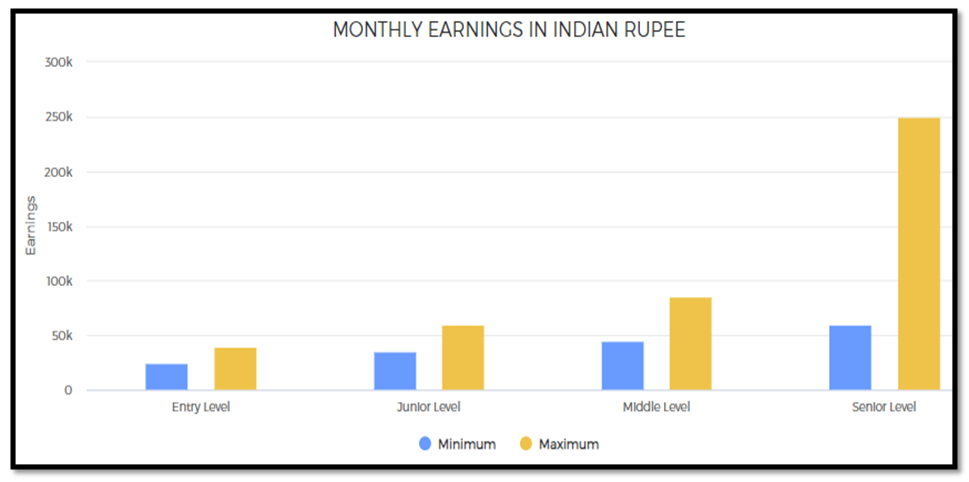
Monthly Earnings In Indian Rupee
Entry Level | Junior Level | Mid Level | Senior Level | ||||
Min Earning | Max Earning | Min Earning | Max Earning | Min Earning | Max Earning | Min Earning | Max Earning |
25000 | 40000 | 35000 | 60000 | 45000 | 85000 | 60000 | 250000 |
1. Entry level: 0 - 2 years of work experience
2. Junior Level: From 1 to 12 years of work experience
3. Mid Level: From 5 to 20+ years of work experience
4. Senior Level:From 10 to 25+ years of work experience (there could be exceptions in some high-end technical, financial, engineering, creative, management, sports, and other careers; also in the near future, people will reach these levels much faster in many careers and in some careers, these levels will have no meaning as those careers will be completely tech skill driven such as even now, there is almost no level in a Cyber Security Expert’s job)
Work Activities
1. Analysing and interpreting data and information - Analysis of data and information to find facts, trends, reasons behind situations, etc.; interpretation of data to aid in decision making.
2. Assessing and determining compliance with standards, laws, rules and guidelines - Using relevant information, auditing information, processes and systems to determine whether organisations or people are complying with standards, laws, rules and guidelines.
3. Calculating and computing - Calculating or computing using various mathematical formula and functions using computers or otherwise; doing financial or commercial calculations or computations.
4. Communicating with co-workers and others - Communicating with people in writing, verbally or otherwise inside your workplace and various other people who have professional relationships with your place of work including vendors, government officials, etc. or with people at large.
5 . Creative thinking - Developing new ideas, concepts, innovative solutions to problems, newer ways of getting things done, designing products and services, creating work of art and craft, etc.
6.Developing and maintaining inter-personal relationships - Developing professional relationships with co-workers and others outside organizations and maintaining good relationships.
7. Getting Information and learning - Observing, hearing, reading, using computers, or otherwise obtaining information and learning from it.
8. Inspecting situations, events, and people - Inspecting situations, events and people to understand the reasons and causes for the situation or events to happen; inspecting people to understand reasons behind their behavior and actions.
9. Making decisions and solving problems - Analysis of data and information; evaluation of alternative decisions and results of decisions; taking the right decisions and solving problems.
10. Organizing, planning and prioritizing tasks - Planning and organising tasks in order to achieve work goals; prioritizing tasks to achieve goals and making the best use of the time available.
11. Processing information - Searching, compiling, tabulating, calculating, auditing, verifying or otherwise dealing with information processing including data entry, transcription, recording, storing and maintaining databases.
12. Strategic planning - Developing visions and goals, developing strategies and action plans for achieving visions and goals.
13. Updating and using relevant knowledge - Keeping updated with the latest knowledge relevant to your fields of work and use of the relevant knowledge in getting things done.
14. Working in a team - Working in a team of people; developing team; maintaining professional relationships among team members.
Future Prospects
1. There is an increasing demand for Public Policy graduates in the public sector, research organizations, non-profit organizations, consulting firms, international organizations, and the government.
2. Every large establishment in almost every industrial vertical in the existing market scenario today have reinstated concrete pursuits of public policy and regulatory affairs related practices. Almost all hefty giants operating or governing verticals including housing, health, social services, advocacy, city planning, education, IT, food & beverages, manufacturing, healthcare, transportation, disaster response, natural resources, media or commerce are actively absorbing professionals with proven expertise in this domain.
3. With advanced market economies and improved income levels, productivity enhancements driven by the vibrant private sector should be promoted by robust public policies too.
4. The relative importance of particular public policies in any country depends on where a country is located along its development path, the stage of economic transformation and surge or decline in growth & productivity.
5. Each country needs a differentiated mix of public policies. Therefore, it is best achieved if formulated at a national level by taking into account country specific parameters. The pursuit of sound economic policies is albeit a prerequisite for growth too.
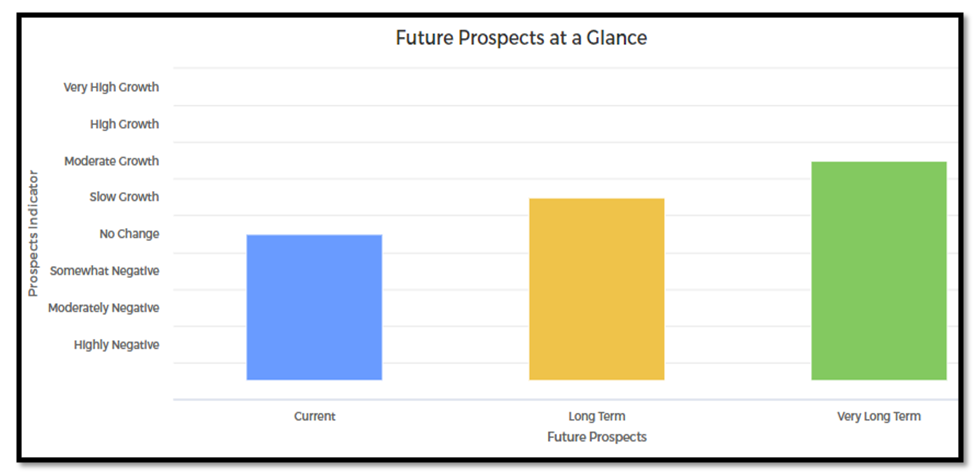
Future Prospects At A Glance
Current (0-1 year) | Long Term (2-5 year) | Very Long Term (6-10 years) |
No Change | Slow Growth | Moderate Growth |


